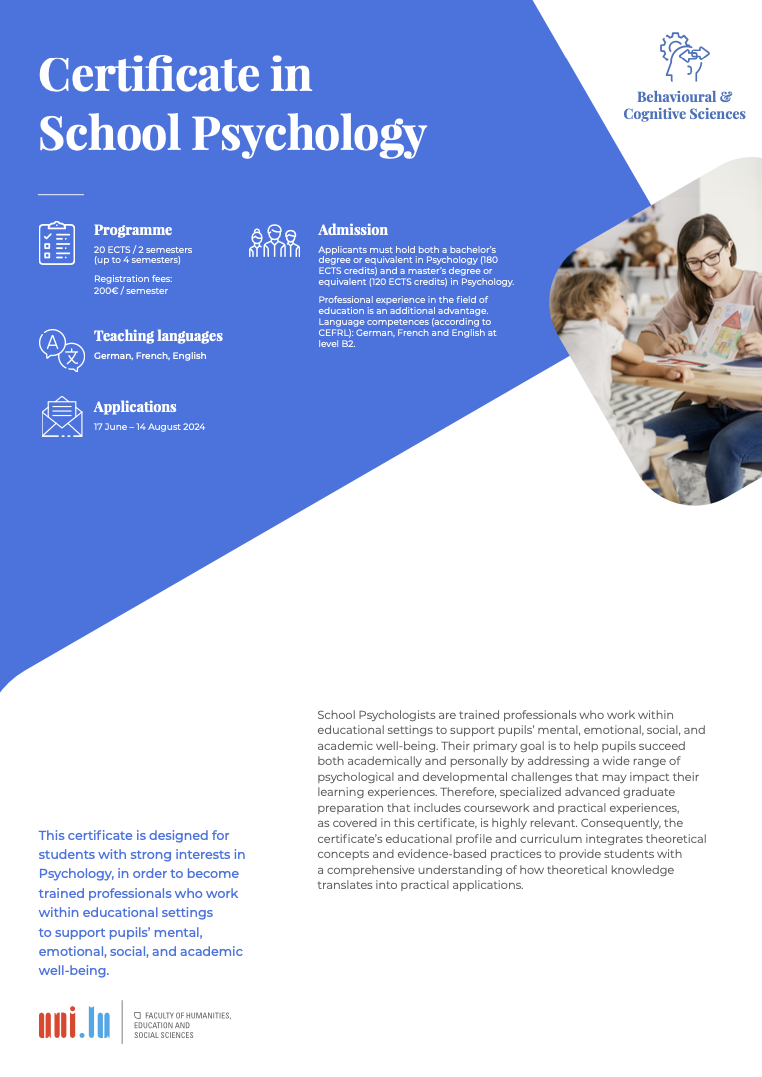Career prospects
As the needs in school psychology are growing and new institutions with additional positions for school psychologists are being created, the need for professionals to develop in the field of school psychology according to academic standards is also increasing. Graduates of the certificate have excellent career prospects, as there is a growing demand for specialists who are trained to academic standards in the field of school psychology.
More info
Download

Disciplinary knowledge
- Theories and Concepts: Demonstrate a solid understanding of school psychological theories and concepts relevant to child and adolescent development, learning, behaviour, and mental health.
- Assessment and Diagnosis: Acquire proficiency in conducting psychological assessments, interpreting assessment results, and making informed diagnoses of psychological challenges in pupils.
- Intervention Strategies: Develop a repertoire of evidence-based intervention strategies to address a wide range of psychological issues, such as learning disabilities, behavioural problems, and emotional struggles.
Transversal skills
- Communication: Exhibit effective communication skills for collaborating with pupils, parents, teachers, administrators, and other stakeholders.
- Problem-Solving: Apply creative problem-solving skills to address challenges within the school environment and facilitate positive outcomes for pupils.
- Ethical and Cultural Sensitivity: Demonstrate awareness of ethical considerations in psychological practice and exhibit cultural competence when working with pupils from diverse backgrounds.
Professional competences
- Counselling and Intervention: Apply counselling techniques to provide individual and group counselling to stakeholders, addressing emotional and behavioural issues and promoting positive mental health.
- Crisis Management: Demonstrate the ability to respond appropriately to crises within the school community, providing support and guidance to stakeholders.
Learning Outcomes
At the end of the programme students are able to
- Demonstrate a comprehensive understanding of key theories in child and adolescent development, legal and ethical foundations, and proficiently conduct psychological assessments to identify and evaluate pupils’ psychological challenges.
- Develop and implement preventive measures and evidence-based interventions to support pupils’ mental health and address diverse psychological issues, ensuring the effectiveness of these strategies through regular evaluation.
- Critically evaluate principles of inclusive education, develop inclusive practices, and advocate for policies that address diverse learning needs, while maintaining ethical standards and cultural sensitivity in all professional interactions.
- Exhibit strong communication skills for effective collaboration with pupils, parents, teachers, and other stakeholders, and employ ethical guidelines in handling sensitive information and decision-making processes.
- Synthesise theoretical knowledge and practical skills to analyse and address real-life challenges in school settings, developing comprehensive, evidence-based solutions and demonstrating readiness to act as effective school psychologists
